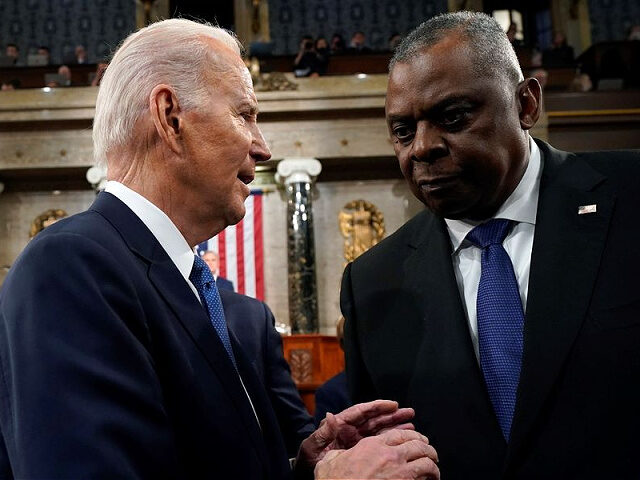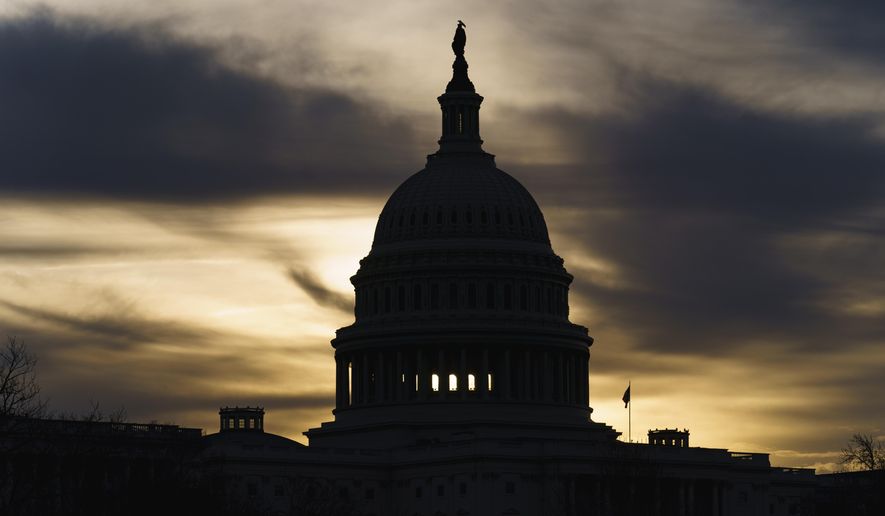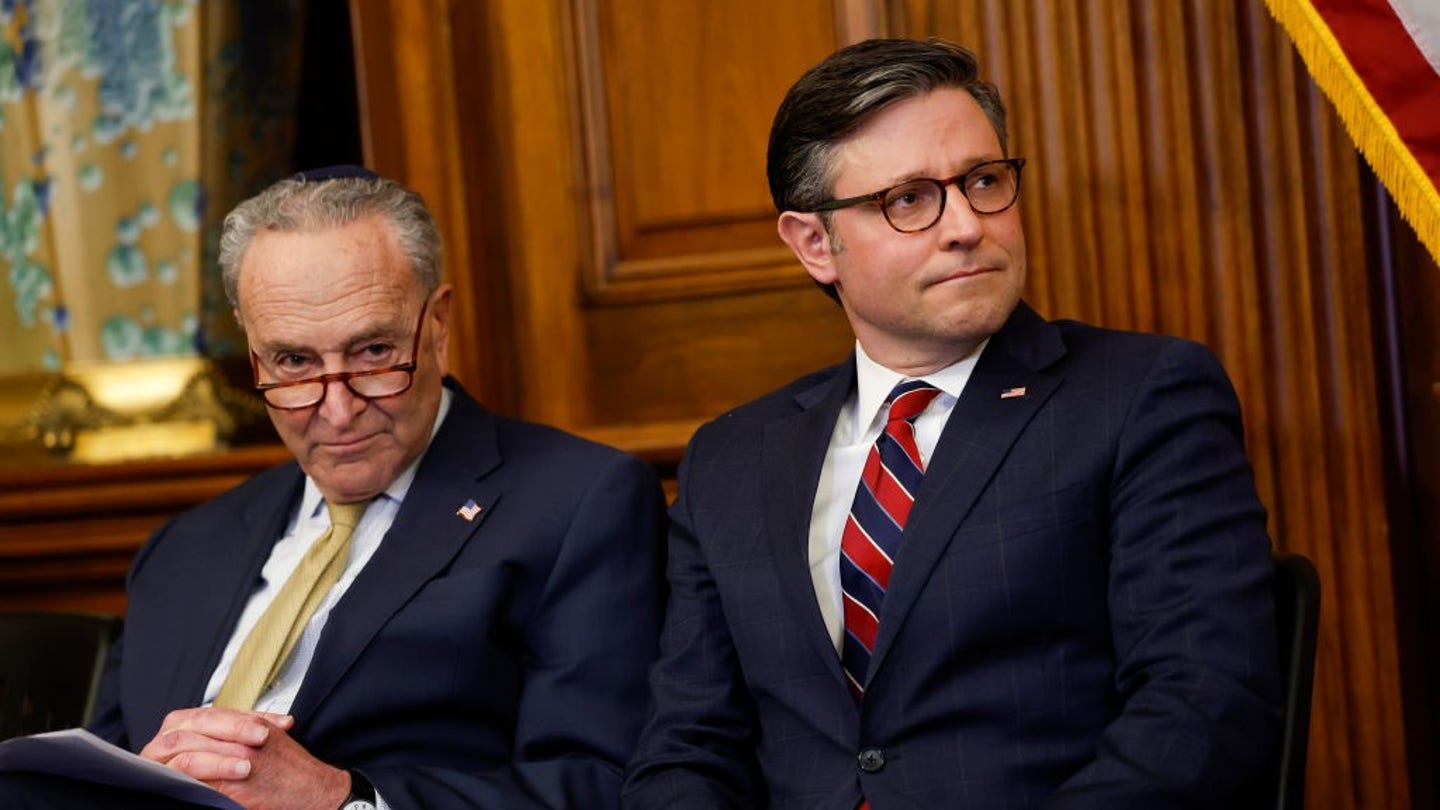Speaker Johnson announces top-line spending deal to avoid government shutdown

Congressional leaders have reached a top-line spending deal to fund the federal government for the rest of fiscal year 2024, the first step to avoid a partial government shutdown in less than two weeks.
The deal is modeled largely on caps and side spending agreements struck in a debt limit deal last year, which included a side agreement for further budget changes that would allow a plus-up for nondefense dollars for most of 2024. Speaker Mike Johnson (R-La. ), though, said Republicans negotiated billions in spending cuts to offset that.
Johnson announced the deal reached with the Senate and the White House in a “Dear Colleague” letter to members Sunday.
“The topline constitutes $1.590 trillion for [fiscal 2024] — the statutory levels of the Fiscal Responsibility Act. That includes $886 billion for defense and $704 billion for nondefense,” Johnson said in the letter.
Senate Majority Leader Chuck Schumer (D-N.Y.) and House Minority Leader Hakeem Jeffries (D-N.Y.) in a separate statement, though, said the deal secured $772.7 billion for non-defense discretionary funding, while also protecting “key domestic priorities like veterans benefits, health care and nutrition assistance from the draconian cuts sought by right-wing extremists.”
House Republicans have pursued a host of partisan riders in their appropriations proposals, including measures targeting abortion access and diversity efforts. Johnson said that Republicans will continue to seek GOP policy riders.
The deal comes as both the House and Senate are set to return from a holiday break this week ahead of a two-tiered government funding deadline, with the first batch of funding expiring on Jan. 19 and the rest expiring on Feb. 2.
The two chambers had been far apart in how they had marked up regular spending bills, with the House passing bills below Fiscal Responsibility Act (FRA) levels and the Senate marking up bills above FRA levels. With a top-line agreement, the two chambers can work to reconcile those differences in the underlying legislation and pass appropriations before the funding deadlines.
The topline numbers are separate from a supplemental spending request from he White House on additional aid for Ukraine and Israel. A bipartisan group of senators have been negotiating a deal to pair border and immigration policy changes with aid to Ukraine.
And getting the deal through both chambers comes as some hardline House Republicans are calling to force a government shutdown over the border.
President Biden in a statement gave his stamp of approval to the spending framework.
“It reflects the funding levels that I negotiated with both parties and signed into law last spring. It rejects deep cuts to programs hardworking families count on, and provides a path to passing full-year funding bills that deliver for the American people and are free of any extreme policies,” Biden said.
Democrats say the side deal struck between the White House and then-Speaker Kevin McCarthy (R-Calif.) at the time would have allowed for north of $60 billion in additional funding for non-defense programs.
Democrats and experts say the changes, which included redirecting billions of dollars from funding for the IRS and coronavirus efforts to other non-defense programs, was key to shielding non-defense programs from a significant funding cut.
However, hardline conservatives have been dialing up the pressure on GOP leadership to abandon what Democrats say was the full agreement in pursuit of steeper spending cuts, with the House Freedom Caucus recently accusing leaders entertaining a deal that would “obscure the actual spending numbers with more shady side deals and accounting tricks.”
Johnson addressed those concerns in his letter.
“As has been widely reported, a list of extra-statutory adjustments was agreed upon by negotiators last summer. The agreement today achieves key modifications to the June framework that will secure more than $16 billion in additional spending cuts to offset the discretionary spending levels,” Johnson said.
The Speaker, though, touted that the spending deal “results in an overall $30 billion total reduction from the Senate’s spending plans.”
“While the levels of emergency spending from FY23 will be maintained, no additional emergency funding, or additional no-outlay changes in mandatory programs (CHIMPS), will be included, thus eliminating two of the worst accounting gimmicks included in the FRA framework,” Johnson said. “Unlike other adjustments, which are by nature limited in time or amount, the adjustments described above threatened to become permanent fixtures of the funding baseline as in previous budget agreements. Removing them now could save taxpayers more than $200 billion over the next 10 years.”
Johnson said that there will be an additional $10 billion in cuts to the IRS mandatory funding, bringing the total to $20 billion, and that $6.1 billion will be cut from “the Biden Administration’s continued COVID-era slush funds.”
“While these final spending levels will not satisfy everyone, and they do not cut as much spending as many of us would like, this deal does provide us a path to: 1) move the process forward; 2) reprioritize funding within the topline towards conservative objectives, instead of last year’s Schumer-Pelosi omnibus; and 3) fight for the important policy riders included in our House FY24 bills,” Johnson said.







